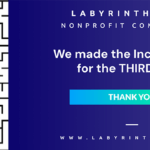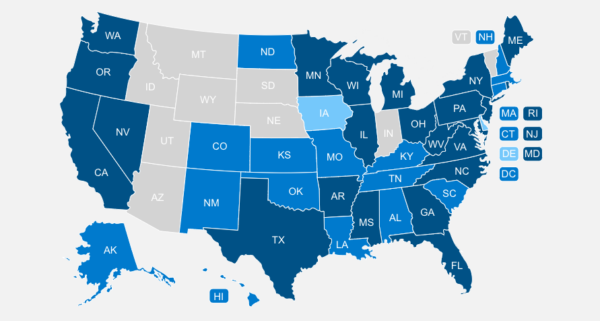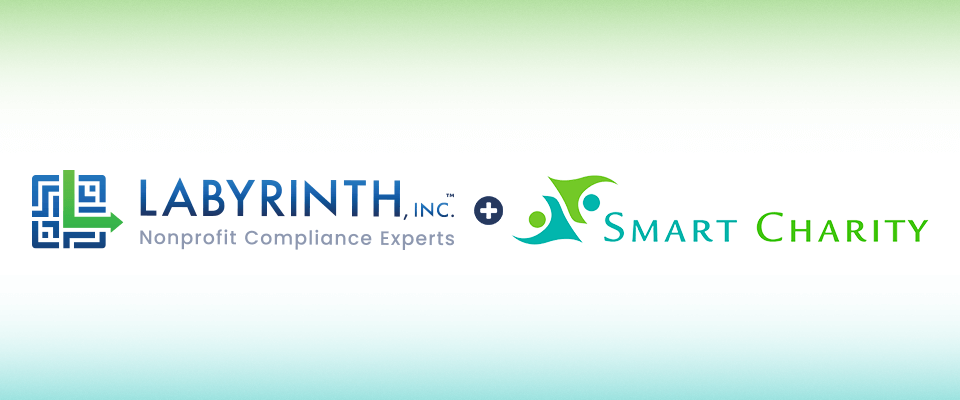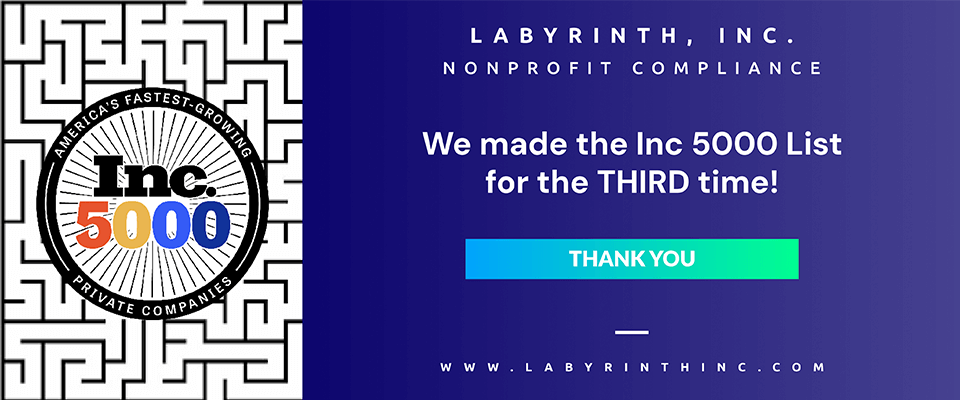
Labyrinth, Inc.: Recognized on the Inc. 5000 List
September 13, 2023
Arkansas and Connecticut New Audit Threshold Requirements
March 4, 2024Corporate Transparency Act: What Does It Mean For My Nonprofit?

Corporate Transparency Act: What Does It Mean For My Nonprofit?
As of January 1, 2024, new regulations under the Corporate Transparency Act (CTA) will require over 30 million organizations to report beneficial ownership information (BOI) to the Financial Crimes Enforcement Network (FinCEN). Nonprofits, especially those without a federal tax exemption, must stay informed about these requirements.
What is the Corporate Transparency Act's Purpose?
The goal of the CTA is to prevent bad actors from hiding their activities and identities behind anonymous companies. By doing so, the CTA plays a crucial role in promoting transparency and combating financial crimes.
How Does the Corporate Transparency Act Accomplish its Purpose?
The CTA mandates that organizations report individuals with ownership and controlling stakes to the Financial Crimes Enforcement Network (FinCEN), unveiling who ultimately benefits from the organization. These individuals are referred to as "beneficial owners." The process involves submitting beneficial ownership information (BOI) via the Beneficial Ownership Secure System (BOSS) and promptly notifying the agency of any changes to the information on file.
Which Individuals Are Categorized as Beneficial Owners?
A beneficial owner is any person with at least 25% ownership or who has significant control over the organization's operations. There is no limit to the number of individuals who can be reported for exercising substantial control. In general, an individual would be a beneficial owner if they fall into any of the below categories:
- Senior Officer - any individual holding the position or exercising the authority of an Executive Director/CEO, President, CFO, General Counsel, COO, or any other officer, regardless of title, who performs similar functions as these officers.
- Appointment or Removal Authority - Anyone able to appoint or remove any senior officer or a majority of the board of directors or similar body.
- Important Decision-Maker - Anyone who directs, determines, or has substantial influence over important decisions made by the organization, including decisions regarding the organization's
- Business, such as:
- Nature, scope, and attributes of the business
- The selection or termination of business lines or ventures or geographic focus
- The entry into or termination, or the fulfillment or non-fulfillment, of significant contracts
- Finances, such as:
- Sale, lease, mortgage, or other transfer of any principal assets
- Major expenditures or investments, issuances of any equity, incurrence of any significant debt, or approval of the operating budget
- Compensation schemes and incentive programs for senior officers
- Structure, such as:
- Reorganization, dissolution, or merger
- Amendments of any substantial governance documents of the reporting company, including the articles of incorporation or similar formation documents, bylaws, and significant policies or procedures
- Business, such as:
- Individuals with any other form of substantial control over the organization. Control exercised in new and unique ways can still be substantial. For example, flexible corporate structures may have different indicators of control than the indicators included here.
What Information Needs to be Reported About Beneficial Owners?
The following organization details are required as part of the BOI report:
- The organization's name
- Any trade or DBA names
- State of formation or registration
- Federal EIN
- ID number from its domicile Secretary of State
- Primary address within the US
Additionally, the following details about all beneficial owners must be included:
- Full legal name
- Date of birth
- Residential address
- Photo ID and issuing jurisdiction
Finally, organizations formed in 2024 and beyond will be responsible for reporting the same information about "company applicants." A company applicant refers to the individual(s) who filed the secretary of state documents to create an entity. For example, you may be the company applicant if you formed your organization. Or, if you worked with a third party to complete filing, that person may be the company applicant.
Which Organizations Need to File Beneficial Ownership Information Reports?
Referred to as "reporting companies," any organization established by submitting a document to a Secretary of State or a similar office, including nonprofits, may be required to report, provided they don't fall into an exempt category. It can also include entities formed under the laws of a foreign country and registered to conduct business by submitting a document to a Secretary of State or a similar office.
Exemptions Most Likely to Apply to Nonprofits
While it's estimated that 97% of organizations operating in the US will need to report BOI, not every organization is faced with filing requirements. There are six exemption categories nonprofits should pay attention to. They are as follows:
1. Credit unions
Any Federal or State credit union, as those terms are defined in Sec. 101 of the Federal Credit Union Act.
2. Tax-exempt entities
Any entity that meets the following criteria: (A) an organization described in Section 501(c) of the Internal Revenue Code of 1986 (excluding Section 508(a) of the Code) and exempt from tax under Section 501(a) of the Code. In the event that such an organization ceases to be described in Section 501(c) and exempt from tax under Section 501(a), it shall be considered a tax-exempt entity for a period of 180 days from the date of the loss of tax-exempt status, (B) a political organization as defined in Section 527(e)(1) of the Code, exempt from tax under Section 527(a) of the Code, or (C) a trust described in paragraph (1) or (2) of Section 4947(a) of the Code.
3. Entities assisting a tax-exempt entities
An entity that meets all of the following criteria is eligible: (A) it exclusively provides financial assistance to or holds governance rights over a tax-exempt entity as described in exemption 19, (B) it is a United States person, (C) it is beneficially owned or controlled exclusively by one or more United States persons who are United States citizens or lawfully admitted for permanent residence, and (D) it derives at least a majority of its funding or revenue from one or more United States persons who are United States citizens or lawfully admitted for permanent residence.
4. Large operating companies
An entity that meets the following criteria is subject to the requirements:
(A) Employs more than 20 full-time employees in the United States, as defined in 26 CFR 54.4980H-1(a) and 54.4980H-3. Note that the term "United States" in these sections of the CFR refers to the meaning provided in 31 CFR 1010.100(hhh).
(B) Maintains a physical office within the United States.
(C) Filed a Federal income tax or information return in the United States for the previous year, indicating gross receipts or sales exceeding $5,000,000. This amount is reported as gross receipts or sales (excluding returns and allowances) on the entity's IRS Form 1120, consolidated IRS Form 1120, IRS Form 1120-S, IRS Form 1065, or other applicable IRS form. Gross receipts or sales from sources outside the United States are not included in this determination, consistent with Federal income tax principles.
For an entity that is part of an affiliated group of corporations, as defined in 26 USC 1504, and filed a consolidated return, the applicable amount is the reported amount on the consolidated return for the group.
5. Subsidiaries of certain exempt entities
Any entity whose ownership interests are controlled or wholly owned, directly or indirectly, by one or more entities mentioned in exemptions 1, 2, or 4 stated above.
6. Inactive entities
To qualify under these conditions, an entity must meet the following criteria:
(A) It must have existed on or before January 1, 2020.
(B) It should not be actively engaged in business operations.
(C) It should not be owned by a foreign person, whether directly or indirectly, wholly or partially.
(D) There should not have been any change in ownership within the past twelve months.
(E) It should not have sent or received funds exceeding $1,000 in the previous twelve-month period, either directly or through any financial account in which the entity or any of its affiliates had an interest.
(F) It should not hold any assets, including ownership interests in any corporation, limited liability company, or similar entity, whether within the United States or abroad.
If your organization falls into these exemption categories, you may not need to report beneficial ownership information to FinCEN.
Exemptions for Tax-Exempt Entities
While most 501(c) and 527 exempt entities will not be required to report beneficial ownership information, it's important to be aware of the following scenarios that may lead to reporting requirements:
- Nonprofits not intending to pursue tax-exempt status - Nonprofits incorporated at the state level but not federally tax-exempt may need to report BOI to FinCEN.
- Recent 1023 Filers with pending tax-exempt status - While an organization’s federal tax exemption is pending with the IRS, it may need to report BOI to FinCEN. Once the IRS grants its tax exemption, an updated report must be submitted to declare its exemption.
- Fiscally-sponsored organizations - A nonprofit corporation sharing the tax-exempt privileges of a fiscal sponsor may need to report BOI to FinCEN. And, if its tax-exempt status changes, it may need to submit an updated report to keep the record current.
- Nonprofits with revoked tax-exempt status - A nonprofit whose tax-exempt status has been revoked by the IRS may need to report BOI to FinCEN. And if its tax-exempt status is reinstated, it may need to submit an updated report.
- Nonprofits with partial controlling interests in other entities - If a nonprofit shares a controlling interest in another entity with a third-party organization that is required to report Beneficial Ownership Information (BOI) to FinCEN, the nonprofit may be responsible for submitting BOI reports on behalf of the controlled entity.
Additional Exemption Categories
The rest of the exemption categories are most likely to impact for-profit businesses. They are as follows:
1. Securities reporting issuer
2. Governmental authority
3. Bank
4. Depository institution holding company
5. Money services business
6. Broker or dealer in securities
7. Securities exchange or clearing agency
8. Other Exchange Act registered entity
9. Investment company or investment adviser
10. Venture capital fund adviser
11. Insurance company
12. State-licensed insurance producer
13. Commodity Exchange Act registered entity
14. Accounting firm
15. Public utility
16. Financial market utility
17. Pooled investment vehicle
18. Subsidiary of certain exempt entities
Any entity whose ownership interests are controlled or wholly owned, directly or indirectly, by one or more entities mentioned in exemptions 1, 2, 3, 4, 6, 7, 8, 9, 10, 11, 12, 13, 14, 15, or 16 stated above.
How to Prepare
As we approach the implementation date of January 1, 2024, organizations must be prepared for the upcoming changes.
- Stay informed: Continuously monitor updates and guidance provided by FinCEN to stay up to date with any changes or clarifications and to understand what requirements apply to you.
- Gather required information: Identify who your beneficial owners are, and start securely gathering the required information.
- Take early action: Labyrinth’s BOI Reporting Service offers guided information collection, and ordering today will allow you to sidestep deadline monitoring obligations.


















